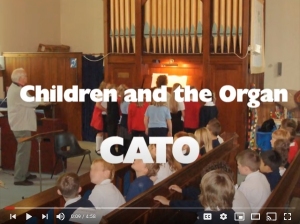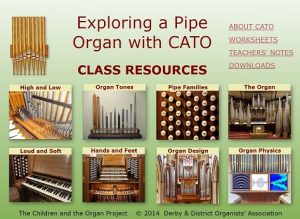Our Educational Project
ORGAN TUITION GRANT SCHEME
Organists are in great demand and the instrument can give immense satisfaction and great pleasure. The Derby and District Organists’ Association wants to encourage people to learn and has a team of experienced teachers available.
We are able to offer an initial set of six free organ lessons to anyone wishing to learn. The funding of the lessons is possible thanks to a legacy left to the Association by Edmund Stow, an organist, conductor and organ builder, who was well known and greatly respected in Derby and Derbyshire.
If possible you should have piano or keyboard facility to the level of about Grade 5, but if not, you are still welcome to enquire. You need to be tall enough to reach the pedals (which probably means you are over twelve years old), but otherwise there are no restrictions on age.
If interested, please contact the Chairman of the Association, Alexander Binns.
DDOA Chairman: ddoachairman@gmail.com
CHILDREN AND THE ORGAN (CATO)
We offer schools a lively experience for pupils in which they can:
- Hear and see a pipe organ being played by a professional
- Have a go themselves
- Find out about how sounds are produced
- See how the mechanics work
- Design your own organ case
- Enjoy a live musical experience
- Understand how the organ is played
The project involves a visit to a church and is aimed primarily at pupils aged 9 –11 and has been carefully developed in consultation with experienced teachers. The pipe organ is a rich source of learning experience for children which is related to the National Curriculum. In particular our project encompasses such aspects as ; music, science, technology, art & design and physical co-ordination.
What do the pupils actually do?
LISTENING
We start by listening to the organ, usually at full blast, which is very exciting and sweeps many children off their feet. We then usually have a brief explanation of how an organ works, using real pipes and including listening games and other simple activities to engage the pupils.
ACTIVITIES
In the ’follow up’ session pupils split into smaller groups and engage in a variety of activities that deepen their understanding of what they have already experienced. These come under 3 main headings:
How it works: Looking at and playing the ‘mini organ’ – a real pipe instrument with 8 notes and 3 stops. Finding out how a variety of pipes produce different sounds.
How it’s played: Watching an organist at work. Trying out a pedal board to understand how the feet are used. Playing the main organ in the church.
What it looks like: Looking at pictures of different instruments, experimenting with different arrangements of pipes and working on pipe decoration.
ALTOGETHER
We usually finish with an interactive listening activity showing how versatile the organ is for making music for all sorts of occasions. There are lots of opportunities for questions.
How long does it last and how many children can we bring?
Our target time is 2 hours to enable us to make the visit really worthwhile. Our optimum number is about 25; 30 is the absolute maximum in order that the children have a worthwhile experience.
What does it cost?
The DDOA members offer their expertise free, but a donation towards travel expenses is always welcome. The church may wish to charge the school for the cost of using the premises.
A workshop in action
Try this link to see a video of how a workshop runs.
Follow up resources
Try this link to find out about our free resources for teachers.
Who do we contact to set up a visit?
The project Co-ordinator: Stephen Johns annestephen.johns@talktalk.net or Tel: (01332) 764792
Download our flier for schools
Background to the project
Nowadays affectionately referred to as ‘CATO’ our educational outreach programme was started in 2008 when the Committee, concerned about the low profile the organ seemed to have within the State Education arena – particularly in Junior Schools – decided to develop a programme that could be used with children in Keystage 2 of the curriculum. In addition, we were acutely aware that our constitution required us to engage in education and that, to date most, if not all of this, was geared to people like ourselves. Further discussions led to the formation of some key features of what such a programme might look like: these included:
1. Whilst taking the organ as a starting point any programme would need to be ‘cross-curricular’ if it were to be of use to teachers. A narrow, purely musical base would not work.
2. Our approach would aim to educate teachers as well as children, encouraging them to see the organ as a very useful resource.
3. It would need to involve the provision of several engaging and interesting workshop activities for children: i.e. it would need to follow best classroom practice and be credible in the eyes of educational professionals.
4. It would need to fit into a realistic timeframe to accommodate school days.
5. It would focus on the organ as an exciting experience for all children whether or not they had specific musical interests or aptitude. We have sometimes found it necessary to re-enforce this with teachers!
Over the years our group of DDOA members has grown from 5 to about 9 and this variety of expertise is enable us to vary what we offer and develop reflect carefully on what we do. We usually do about 7 or 8 ‘shows’ a year and find that that is plenty.
By far the best way to get invited to work with schools is via a personal contact, though the flier does sometimes do the trick. We also have to ensure that there is a church nearby with a suitable instrument and friendly clergy – this is nearly always the case. For children the key experience is usually trying out the organ for themselves, but to enable this to happen a group must be no more than 6 and from that it follows that the rest of the class need to benefit from other activities (see above) in a ‘ circus’ format. We were very fortunate early on in the project to have within our group a local organ –builder (Edmund Stow) who kindly built us a ‘mini organ’ which the children can play and observe the workings of simple mechanical action. In addition to the activities we can provide back-up materials for schools, prepared by one of our members – Dr Laurence Rogers.
We have, on occasions, tried to work with Secondary school pupils but the rigidity of timetabling and the ever growing deadweight of ‘assessment’ are a major disincentive. There have also been one or two ‘Organ Open Days’ at Derby Cathedral and events involving church congregations and parents. These are great fun but very demanding in terms of organisation. A recent event aimed at local Primary School staff was, sadly, poorly attended.
We can in all honesty say that teachers and children are very enthusiastic about what we offer once we get them in a church but persuading them to come in the first place is far more challenging. Schools seem to face ever growing pressures on their time and resources and some are reluctant to try anything new. I should add that we do not make any charge, but do ask for a contribution to travel expenses.
Stephen Johns (Project Co-ordinator)


